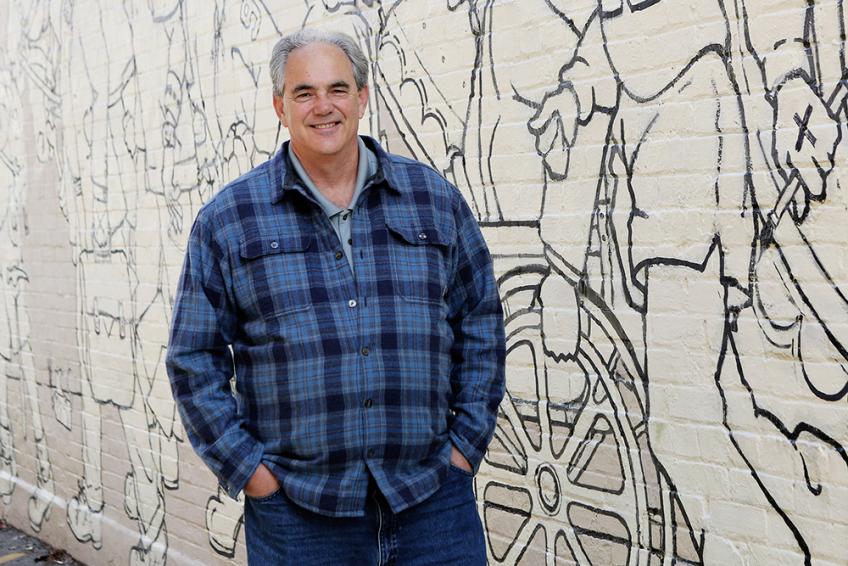
“Chapel Hill and Carrboro are not known for being “development friendly in the same way that Cary is. You’re not going to find sprawling subdivisions or high-rises going up without careful scrutiny – and that’s why I love being in real estate here.”
To say that Don is a native of Chapel Hill is somewhat of an understatement. He and both parents were born here. In fact, on his mother’s side, his family goes back 8 or 9 generations – right back to the early land grants. Don’s family is even responsible for taking care of Ramses – the mascot of UNC’s football team. This prestigious honor is a source of pride for Don, and some pretty hair-raising stories too:
“As a kid, I used to get to sleep in the barn before a big game to guard the ram and make sure Ramses didn’t get kidnapped. You don’t get much more exciting childhood adventures than that!”
Diversity breeds openness
Don credits the diverse nature of Chapel Hill and Carrboro’s population as being a huge influence on his worldview:
“This town was a wonderful place to grow up. You had book educated, widely traveled families connected to UNC, and then you had fourth or fifth generation farmers working the land just outside the town. I always prided myself on being able to connect with both the town folks and the kids out in White Cross, Calvander or wherever.”
True service means a partnership
After working in sales for his family’s hardware business for over 10 years, Don found himself looking for a livelihood that offered a bigger challenge, and a chance to serve clients on a deeper level:
“In real estate, there is more opportunity to help people to find what they were really looking for.”
So Don left the hardware store one day, walked over to Weaver Street Realty, and has been here ever since. He recently marked his twentieth anniversary with Weaver Street. Thirty years working on Main Street, he’s connected. This is the second job he’s ever had.
Community and people first, profit comes after
Part of the reason, says Don, that he has stayed with the company so long is that there is a larger sense of purpose than simply buying or selling houses. In fact, if a sale does not feel right – either for the client or for the broader community, Don – and many of his colleagues – are likely to speak up:
“It’s so nice working for a real estate agency where there is no corporate line that says I can’t oppose a development that is wrong. In fact, we as an agency have been very explicit about the kind of development that we feel is good for the community – we’ve even turned down deals that don’t fit the bill.”
That sense of doing what’s right, even if it is not in your immediate short term interests, also extends to how Don treats his clients:
“I am not afraid to tell someone to wait. If a house doesn’t feel right, if a seller doesn’t get the deal they are looking for, or if a buyer just isn’t ready to own a home yet – I see it as my role to speak up.”
A heart has its place. Guess what? So does logic
When discussing what advice he’d give to people getting into buying or selling, Don says it is important to get the right balance between listening to your heart, but also allowing your logic to guide you:
“On the one hand, a house is your home. Of course, you should pay attention to how it feels, and what kind of life you can create there. But it is also a collection of sheet-rock and two-by-fours. It’s important to not let your emotions – especially negative emotions and stress – run away with you. Buying and selling real estate is not the life-and-death stuff it sometimes feels like. I like to think that I can bring a level head to the table and help remind people of that fact.”
In the end, says Don, your real estate transactions are likely to be the most important business decision of your personal life. So it makes sense to bring someone onboard to help who you trust, who you enjoy spending time with, and who has both the expertise and the attitude to get things done.
Belief: “It’s so nice working for a company where there is no corporate line that says I can’t oppose a development that I feel is wrong. In fact, we have been very explicit about the kind of development that we feel is good for the community – we’ve even turned down deals that don’t fit the bill.”
Background: To say that Don is a native of Chapel Hill is somewhat of an understatement. In fact, on his mother’s side, his family goes back 8 or 9 generations – right back to the original land grants.